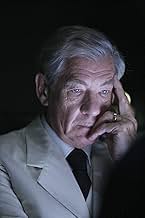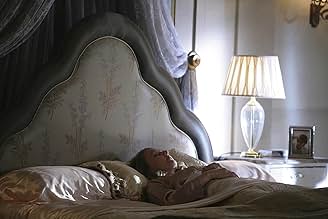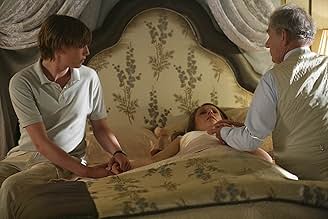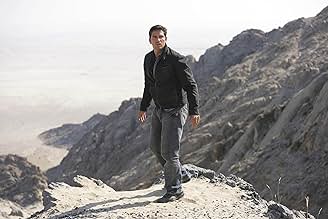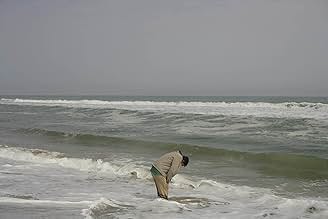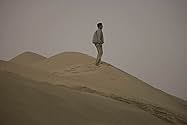The Prisoner
- टीवी मिनी सीरीज़
- 2009
- 45 मि
IMDb रेटिंग
6.1/10
8.2 हज़ार
आपकी रेटिंग
अपनी भाषा में प्लॉट जोड़ेंAn update to the cult favorite series from the 1960s about a government agent who is kidnapped and sent to a remote island known as "The Village."An update to the cult favorite series from the 1960s about a government agent who is kidnapped and sent to a remote island known as "The Village."An update to the cult favorite series from the 1960s about a government agent who is kidnapped and sent to a remote island known as "The Village."
- 2 प्राइमटाइम एमी के लिए नामांकित
- 10 कुल नामांकन
एपिसोड ब्राउज़ करें
फ़ीचर्ड समीक्षाएं
Yikes. I don't know what standards The Prisoner is being compared to by other reviewers (other than obviously the original series, which is completely different). While not absolutely stellar, it certainly is superior to almost everything out there on network TV. While it's sometimes difficult to figure out where the four first hours are going, the last two hours are really delivered with the tone of cerebral and philosophical thriller that chillingly ties the mini-series together. I thought the Prisoner's social commentary on the balance between impersonal technology and personal consciousness which is hammered home in the ending sequences was especially effective. The acting level was also certainly above network TV level -- McKellen giving a creepy performance that ultimately becomes understandable as No. 2, and Cazieval, who likes many of his other roles, brings a humanity to character who doesn't quite understand what is going on to him. There are certainly flaws in the production and scripting, but if you come with an open mind and not prepared to judge the series in the context of the original series, I think it's a worthwhile investment of the viewer's time.
1967's Cold War and its counter culture are gone; they've been replaced by 2009's global village and its consumer culture. So 2009's Prisoner is no longer an angry young man fighting for his identity against secret government policies and flagrant brainwashing, he's an angst-ridden 30-something trying to hang on to his identity in the face of overwhelming marketing and soothing pharmaceuticals.
2009's The Prisoner takes all the familiar elements of 1967's cult classic and re-interprets them in a relevant way, just like good remakes are supposed to. The psychedelic, lava-lamp surrealism of the sixties may be gone, but, don't worry, they've been replaced by the post-modern, dream-like surrealism of the oughts.
Yes, the Village still needs to assimilate No. 6, but it no longer cares why he would wish to resign from its society, it only wants him to understand that he can't. Instead of foiling No. 6's repeated escape attempts from the superficially charming, but inherently oppressive, Village, this new Village, still just as pleasant-looking, and oppressive, just makes it clear that there is no place else to escape to. The consumer culture and its global village are everywhere now. There is no escape.
So, instead of a government desperately trying Pavlovian conditioning, hypnotic suggestion, and hallucinogens in the water, a corporation tries matching people with their perfect mates, giving them mind-numbing jobs to take their minds off their melancholy, distracting them with melodramatic soap operas, and, maybe, making them feel a little better with some gene-therapy.
Sure, everyone's still under surveillance in this Village, but this time, its not the Village government trying to identify revolutionaries so it can silence them, its the Summakor corporation trying to identify dreamers so it can subject them to a concentrated dose of consumer culture. And if that doesn't work, maybe a few pharmaceuticals and a promotion will co-opt the more troublesome ones.
2009's The Prisoner takes all the familiar elements of 1967's cult classic and re-interprets them in a relevant way, just like good remakes are supposed to. The psychedelic, lava-lamp surrealism of the sixties may be gone, but, don't worry, they've been replaced by the post-modern, dream-like surrealism of the oughts.
Yes, the Village still needs to assimilate No. 6, but it no longer cares why he would wish to resign from its society, it only wants him to understand that he can't. Instead of foiling No. 6's repeated escape attempts from the superficially charming, but inherently oppressive, Village, this new Village, still just as pleasant-looking, and oppressive, just makes it clear that there is no place else to escape to. The consumer culture and its global village are everywhere now. There is no escape.
So, instead of a government desperately trying Pavlovian conditioning, hypnotic suggestion, and hallucinogens in the water, a corporation tries matching people with their perfect mates, giving them mind-numbing jobs to take their minds off their melancholy, distracting them with melodramatic soap operas, and, maybe, making them feel a little better with some gene-therapy.
Sure, everyone's still under surveillance in this Village, but this time, its not the Village government trying to identify revolutionaries so it can silence them, its the Summakor corporation trying to identify dreamers so it can subject them to a concentrated dose of consumer culture. And if that doesn't work, maybe a few pharmaceuticals and a promotion will co-opt the more troublesome ones.
OK, I get the concept that the AMC production is in no way a sequel-type update to the 60's TV show. No argument there.
But--and I am sincere--can anyone actually provide me (and probably MANY others) with a detailed story line? A CLEAR plot summary? The writers/producers obviously wanted to keep viewers guessing and engaged, but there was never enough detail to determine which were flashbacks and which were...something else. And the last chapter was way too obtuse. It's fine that parts of the series wanted to comment on grand themes and deep societal concepts like the original did, in a modern way, but a more sharply-defined story line could easily do that, and probably hold everyone's attention longer. (Note: I can't buy into any explanation that says "It was all an allegory...it's whatever you think it means." There was enough of that already built-in to each episode.)
The pacing was awfully slow. The whole story could have been told well in 4 hours instead of 6. I found myself starting to want more unexplained holes in the sand and explosions just to pick up the action a bit.
You don't suppose that this was all an evil trick, the creation of a wicked team, to get us to watch all the episodes and then realize that WE were the prisoners for six hours?
But--and I am sincere--can anyone actually provide me (and probably MANY others) with a detailed story line? A CLEAR plot summary? The writers/producers obviously wanted to keep viewers guessing and engaged, but there was never enough detail to determine which were flashbacks and which were...something else. And the last chapter was way too obtuse. It's fine that parts of the series wanted to comment on grand themes and deep societal concepts like the original did, in a modern way, but a more sharply-defined story line could easily do that, and probably hold everyone's attention longer. (Note: I can't buy into any explanation that says "It was all an allegory...it's whatever you think it means." There was enough of that already built-in to each episode.)
The pacing was awfully slow. The whole story could have been told well in 4 hours instead of 6. I found myself starting to want more unexplained holes in the sand and explosions just to pick up the action a bit.
You don't suppose that this was all an evil trick, the creation of a wicked team, to get us to watch all the episodes and then realize that WE were the prisoners for six hours?
Movie kept my interest. It separates from the original series in numerous ways. I would have preferred a closer match. That said, I thought the approach to this was still OK, and kudos to the actors who did a very nice job.
However, this remake failed with the ending of the movie. I won't spoil it. I believe the audience is left with just not believing the main character would act that way -- based on the story's own construction of the character. A story can take any twist, which is is fine, but if it makes a character act "out of character" one loses faith in the story. In this case, there is no justification for the ending based on what was seen. Unfortunate writing at the end.
However, this remake failed with the ending of the movie. I won't spoil it. I believe the audience is left with just not believing the main character would act that way -- based on the story's own construction of the character. A story can take any twist, which is is fine, but if it makes a character act "out of character" one loses faith in the story. In this case, there is no justification for the ending based on what was seen. Unfortunate writing at the end.
As a fan of the original Prisoner I can't begin to say how incredibly disappointed I am with this "remake". The "plot" is non-existent and makes no sense. It might be good if it had characters that made kept your interest in spite of the unintelligible plot line but sadly there isn't a single character that makes me care about what happens to them. In the original Patrick McGoohan was an excellent actor and portrayed an engaging character. The character of 6 in the original embodied the admirable quality of not giving up in spite of the odds. He was direct, smart and capable. In contrast, this 6 is a confused mamby-pamby guy with the personality of a doorstop. I am especially disappointed that one of my favorite actors, Ian McKellen would agree to appear in this mess. I think Patrick McGoohan is turning over in his grave.
क्या आपको पता है
- ट्रिविया"Be seeing you" is a commonly-heard phrase in The Prisoner (1967), this movie, and was also one of Patrick McGoohan's catchphrases in Danger Man (1960) and Danger Man (1964) . McGoohan's character "Johnny Cousin" (a pot-smoking drummer) in All Night Long (1962) uses the phrase also when he says goodbye to the road manager "Berger" towards the end of the movie.
- कनेक्शनFeatured in A Six Hour Film Shot in 92 Days: The Diary of 'The Prisoner' (2010)
टॉप पसंद
रेटिंग देने के लिए साइन-इन करें और वैयक्तिकृत सुझावों के लिए वॉचलिस्ट करें
- How many seasons does The Prisoner have?Alexa द्वारा संचालित
विवरण
- चलने की अवधि45 मिनट
- रंग
- पक्ष अनुपात
- 1.78 : 1
इस पेज में योगदान दें
किसी बदलाव का सुझाव दें या अनुपलब्ध कॉन्टेंट जोड़ें



